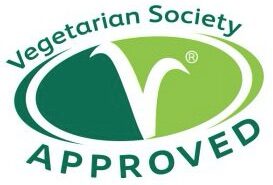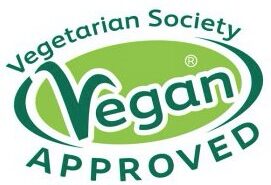Trademark Criteria
Vegetarian trademark criteria
a) Contains no ingredient made from animal body parts
The Vegetarian Society Approved vegetarian trademark cannot be displayed on any product that contains, consists of, or has been produced with the aid of products consisting of or created from, any part of the body of a living or dead animal. This includes, but is not limited to, any of the following:
• Animal flesh or body parts (e.g. meat, poultry, fish,shellfish, insects)
• Meat, fish or bone stock/stock cubes
•Animal carcass fats (including suet, lard or dripping)
• Gelatine, aspic, gelatine-based block or jelly crystals, or isinglass
• Animal rennet or any other by-product of slaughter
• Royal Jelly
• Shellac
• Any food or ingredient made with processing aids created from any of the above
The Vegetarian Society is happy to give further advice on products or ingredients and is happy to work with companies to find suitable alternatives.
b) Only free-range eggs are used
The Vegetarian Society will not accredit products that contain battery eggs or any other intensive system of egg production. The Vegetarian Society can accredit products that use free-range eggs which are produced in accordance with the EU criteria for free-range egg farming.
c) Measures in place to avoid cross-contamination during production
In order to be eligible for the Vegetarian Society Approved vegetarian trademark, all reasonable and practicable steps must be taken to prevent cross-contamination between the vegetarian product in question and non-vegetarian products/ingredients during production. If the same production line is shared with non-vegetarian products/ingredients, thorough cleaning must be carried out before vegetarian production commences. This extends to all associated machinery, equipment, utensils, surfaces and clothing, which must remain clear of non-vegetarian products/ingredients before vegetarian products are touched, prepared, produced or packaged. Clear procedures must be in place to ensure correct packaging is used, and errors are avoided.
This relates to industry standards for manufacturing, not allergen standards.
d) GMO-free
Genetically modified ingredients or products containing genetically modified ingredients are not eligible to be licensed to carry the Vegetarian Society Approved trademark. Vegetarian rennet used in cheese-making is acceptable.
e) No animal testing carried out or commissioned
i) Cosmetic and Household Products
All cosmetic and household products (and their ingredients) must not be tested on animals. This includes experiments conducted or commissioned by the manufacturing company or by any other company on its behalf or on behalf of its suppliers. Each company licensed to carry the Vegetarian Society Approved vegetarian trademark must also inform the Vegetarian Society of any animal testing cut-off date it may have.
ii) Food Products
The Vegetarian Society will not accredit any new food product for sale in the UK for which the producing company has carried out or commissioned animal testing, either for the finished product or any ingredient, unless such testing was a proven an unavoidable legal requirement.

Vegan trademark criteria
a) Contains no animal-derived ingredients
The Vegetarian Society Approved vegan trademark cannot be displayed on any product that contains, consists of, or has been produced with the aid of products consisting of or created from, any part of a living or dead animal, or any substance that has originated from an animal.
This includes, but is not limited to, any of the following:
• Animal flesh or body parts (e.g. meat, poultry, fish, shellfish, insects)
• Meat, fish or bone stock/stock cubes
• Animal carcass fats (including suet, lardor dripping)
• Gelatine, aspic, gelatine-based block or jelly crystals, or isinglass
• Animal rennet or any other by-product of slaughter
• Royal Jelly
• Dairy products
• Eggs
• Honey
• Beeswax
• Shellac
• Lanolin (from wool)
• Any food or ingredient made with processing aids created from any of the above
The Vegetarian Society is happy to give further advice on products or ingredients and is happy to work with companies to find suitable alternatives.
b) Measures in place to avoid cross-contamination during production
In order to be eligible for the Vegetarian Society Approved vegan trademark, all reasonable and practicable steps must be taken to prevent cross-contamination between the vegan product in question and non-vegan products/ingredients during production. If the same production line is shared with non-vegan products/ingredients, thorough cleaning must be carried out before vegan production commences. This extends to all associated machinery, equipment, utensils, surfaces and clothing, which must remain clear of non-vegan products/ingredients before vegan products are touched, prepared, produced or packaged. Clear procedures must be in place to ensure correct packaging is used, and errors are avoided.
This relates to industry standards for manufacturing, not allergen standards.
c) GMO-free
Genetically modified ingredients or products containing genetically modified ingredients are not eligible to be licensed to carry the Vegetarian Society Approved vegan trademark.
d) No animal testing carried out or commissioned
i) Cosmetic and Household Products
All cosmetic and household products (and their ingredients) must not be tested on animals. This includes experiments conducted or commissioned by the manufacturing company or by any other company on its behalf or on behalf of its suppliers. Each company licensed to carry the Vegetarian Society Approved vegan trademark must also inform the Vegetarian Society of any animal testing cut-off date it may have.
ii) Food Products
The Vegetarian Society will not accredit any new food product for sale in the UK for which the producing company has carried out or commissioned animal testing, either for the finished product or any ingredient,unless such testing was a proven and unavoidable legal requirement.

